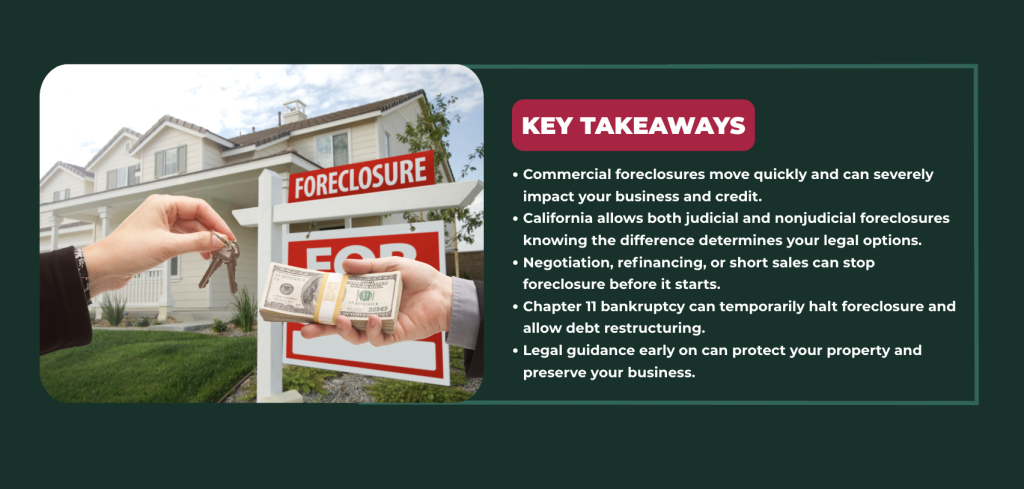When most people think of foreclosure, they imagine a family losing their home. But for California business owners, commercial foreclosure can feel just as devastating often faster, more complex, and with far fewer legal protections.
If you’re a business owner facing the threat of foreclosure, know this: you still have options. At ACE California Law, our mission is simple to protect your property, your peace of mind, and your future. Our team of experienced real estate attorneys helps California business owners fight back, find leverage, and protect what they’ve built.
How Commercial Foreclosure Impacts Business Owners
Commercial foreclosures don’t happen overnight. By the time you receive a Notice of Default, you’ve likely been under months of financial stress. The consequences can go beyond your property they can affect your reputation, credit, and confidence.
Long-Term Credit Damage
Just like residential foreclosures, a commercial foreclosure can damage your business credit score, making it harder to secure loans or lines of credit in the future. Even if you do qualify, interest rates may skyrocket, cutting into your profits.
Reputation and Client Trust
In the business world, reputation is currency. Losing property through foreclosure can raise concerns among clients, investors, or partners even if the circumstances were beyond your control.
Emotional and Psychological Strain
Owning a business is deeply personal. Facing foreclosure can feel like failure, but it isn’t. Many successful entrepreneurs recover from foreclosure by acting strategically and getting professional support early.

Understanding Judicial vs. Nonjudicial Foreclosure
California’s foreclosure laws apply to both residential and commercial properties. There are two primary types:
Nonjudicial Foreclosure
If your mortgage includes a power of sale clause, your lender can foreclose without going to court. This process is fast, often taking just a few months. It’s the most common type of commercial foreclosure in California.
Judicial Foreclosure
This process requires your lender to file a lawsuit in court. While it takes longer, it gives you time and legal standing to challenge the foreclosure or negotiate solutions. In some cases, the lender may also ask the court to appoint a receiver, transferring control of the property including rent collection away from you.
How the Commercial Foreclosure Process Works
While every situation is unique, most commercial foreclosures follow a similar pattern:
- Notice of Default — Once payments are missed, the lender notifies you. Catching up now can stop the process entirely.
- Notice of Sale — If you can’t bring the loan current, the lender schedules a trustee’s sale.
- Foreclosure Sale — The property is sold to the highest bidder.
- Deficiency Liability — You may still owe money if the sale price is lower than your loan balance.
This is why proactive legal help can make all the difference — once the sale is scheduled, options narrow quickly.
Legal Options to Halt a Commercial Foreclosure
You have more control than you may think. Even if saving the property isn’t possible, the right approach can protect your finances and your business reputation.
1. Sell or Refinance Before Default
If foreclosure hasn’t begun, refinancing or selling the property can preserve your credit and equity. This proactive move lets you stay in control rather than the lender.
2. Short Sale
In a short sale, the lender agrees to let you sell the property for less than what you owe. While you won’t keep the property, you may avoid the long-term credit damage of a foreclosure. Ask your lender for a written release of the deficiency balance to avoid lingering debt.
3. Deed in Lieu of Foreclosure
If foreclosure has already begun, you can voluntarily transfer ownership of the property to your lender. In exchange, they may forgive the remaining loan balance, avoiding court involvement and additional fees.
4. Fight the Foreclosure in Court
If you suspect your lender failed to follow California’s legal procedures, you can challenge the foreclosure. Common defenses include:
- Missing or improper foreclosure notices
- Violations of your mortgage contract
- Lender or servicer errors in handling your account
Even if litigation doesn’t stop the foreclosure completely, it can delay proceedings and strengthen your position for negotiation.
Negotiation and Loan Modification Options
Many business owners wait too long to seek help, but early negotiation often saves both the property and the business.
- Loan Modification: Lenders may extend loan terms or lower payments to make them manageable.
- Forbearance or Payment Pause: Temporary relief if your cash flow issues are short-term.
- Workout Agreements: Customized repayment plans tailored to your situation.
Lenders often prefer modification over foreclosure, but only if you act before the process goes too far.
Financial and Operational Impacts of Foreclosure
Understanding what’s at stake helps you plan ahead.
- Operational Disruption: Losing your space can stop operations immediately.
- Equity Loss: Foreclosure wipes out your investment and accumulated equity.
- Tax Liability: Forgiven mortgage debt may count as taxable income.
- Credit & Reputation Damage: Both business and personal credit may take years to rebuild.
Foreclosure is not just a property issue it’s a full-scale business challenge.
When Bankruptcy Becomes a Viable Option
In some cases, Chapter 11 bankruptcy can be a strategic tool — not a last resort. Filing triggers an automatic stay, temporarily halting all foreclosure proceedings. This gives you time to reorganize debts and propose a repayment plan.
However, bankruptcy law is complex. The right attorney can help determine whether bankruptcy is the best strategy or if other legal remedies can achieve the same protection with fewer consequences.
Why Timely Legal Advice Matters
Commercial foreclosures move fast — often faster than homeowners realize. California’s foreclosure laws favor lenders in commercial settings, so timing is everything.
An experienced foreclosure defense attorney can:
- Review your loan documents and foreclosure notices
- Identify lender errors or violations
- Negotiate short sales, forbearance, or loan modifications
- Protect your rights in court if litigation becomes necessary
The sooner you act, the more leverage you’ll have to protect your property and your business.
Take Back Control of Your Business Future
A commercial foreclosure doesn’t have to mean the end of your business. With the right legal strategy, you can protect your assets, minimize financial loss, and move forward with confidence.
At ACE California Law, we’ve helped countless California business owners navigate foreclosure with clarity and strength. Whether through negotiation, litigation, or restructuring, we fight to protect your property and your peace of mind.
Call ACE California Law at (833) 342-2323 or visit our contact us page today to schedule a consultation. Protect your property. Protect your peace of mind. Protect your future.






